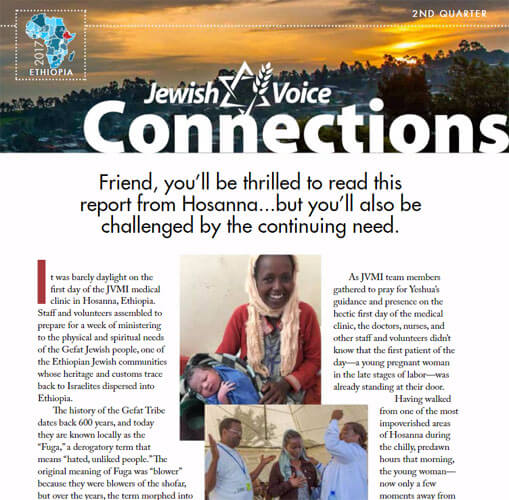Timothy P. Smith | The Chamberlain Key
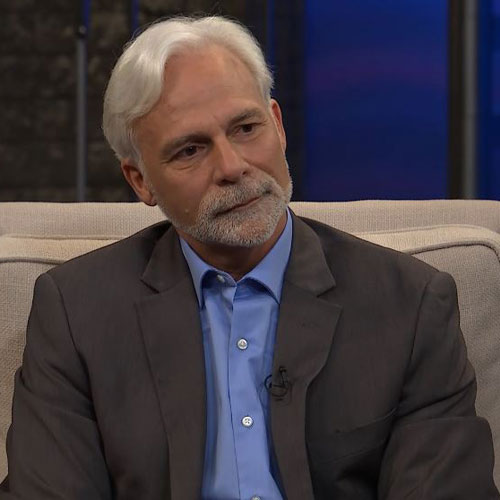

Immediately following Israel’s somber Memorial Day (Yom HaZkraron), Israel celebrates its Independence day, Yom HaAtzmaut. It is a day of rejoicing commemorating Israel’s rebirth as an independent nation.
The country celebrates with parades, flags, free public shows, and a torch lighting ceremony. Families gather for picnics and outdoor recreation, the president delivers a speech, and the prestigious “The Israel Prize” is awarded. This award recognizes individual Israelis who have uniquely contributed to the country’s culture, science, arts, and humanities.
You often hear that Israel became a nation “overnight.” It’s true. However, there was much going on in the decades before May 14, 1948 that prepared the soil for the instant appearance of the budded state. For instance:
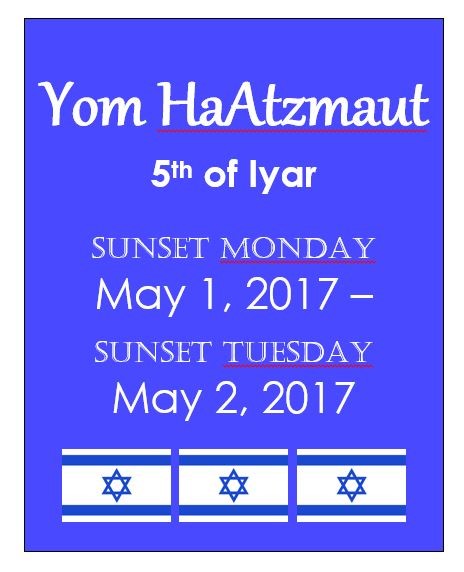
1897 – The First Zionist Congress met in Basel, Switzerland, organized by Theodore Herzl. The new Congress served to unify a previously fragmented movement to establish a Jewish homeland. After the assembly, Herzl wrote in his diary, “At Basle [sic], I founded the Jewish state… If not in five years then certainly in fifty, everyone will realize it” (Jewish Virtual Library).
1917 – The Balfour Declaration (Nov 1917) was a British statement of support for establishing in the Palestinian region a national homeland for Jewish people. Arthur Balfour, the British foreign secretary, made the declaration in a letter to Lionel Rothschild, a leader of the British Jewish community.
1937 – The Peel Commission sought to resolve the opposing aims of Jewish people and Arabs in the area. Neither side was happy about the proposed plans, the Jews because the allotted area was less than 20% of the region under consideration, and the Arabs because they feared it would require some Arabs to “live under Jewish domination” (Jewish Virtual Library). “Nevertheless, the Zionists decided to negotiate with the British, while the Arabs refused to consider any compromises” (Jewish Virtual Library).
1947 – The British, who had been charged with governing the region since 1922 and with helping establish a Jewish homeland there, could not find an agreement suitable to both Jews and Arabs. So, in February 1947, they turned the matter over to the United Nations. A delegation to the region discovered that the conflicting goals of each party could not be reconciled, and voted to recommend two separate states, Jewish and Arab. In November, the UN announced the approval of its Partition Plan giving land to the Jews for a new state. Arab protestors almost immediately initiated violence and riots.
May 14, 1948 – On the date that the British mandate (governance of the Palestinian region) expired, Israel proclaimed its independence as a sovereign nation-state. David Ben-Gurion wrote the Israeli Declaration of Independence and read it aloud that Friday afternoon during a short ceremony “held at 4 pm before the British left to avoid making the declaration on Shabbat” (Jewish Virtual Library).
With trust in Almighty God, we set our hand to this Declaration, at this Session of the Provisional State Council, in the city of Tel Aviv, on this Sabbath eve, the fifth of Iyar, 5708, the fourteenth day of May, 1948.
¾ From Israel’s Declaration of Independence (PBS.org)
People danced in the streets because it “was one of the most remarkable, inspiring achievements in human history: A people which had been exiled from its homeland two thousand years before… but which had refused to relinquish its identity… was returning home as sovereign citizens in their own independent state” (New Essays on Zionism, “Ben-Gurion and the Return to Jewish Power,” Michael B. Oren).
Israel as a nation is a miracle. By God’s design and in fulfillment of Bible prophecy, He brought His people back into the Land He gave them so long ago. We celebrate with Israel the joyous occasion of her return to the Land and independence as a free nation. Happy Yom Atzmaut, Israel! Happy Independence Day!
The miraculous story of Israel’s restoration has been captured in an inspiring documentary and companion book. Click here for “The Miracle of Israel.”
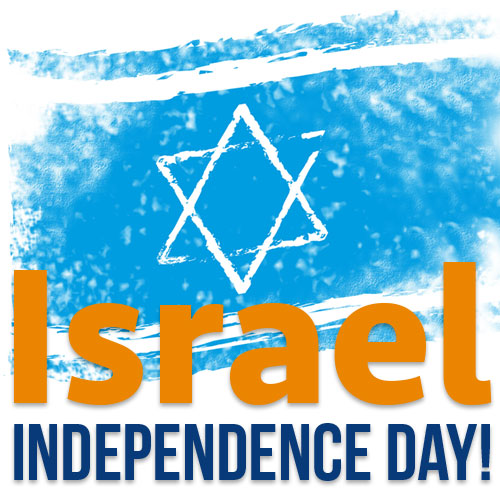
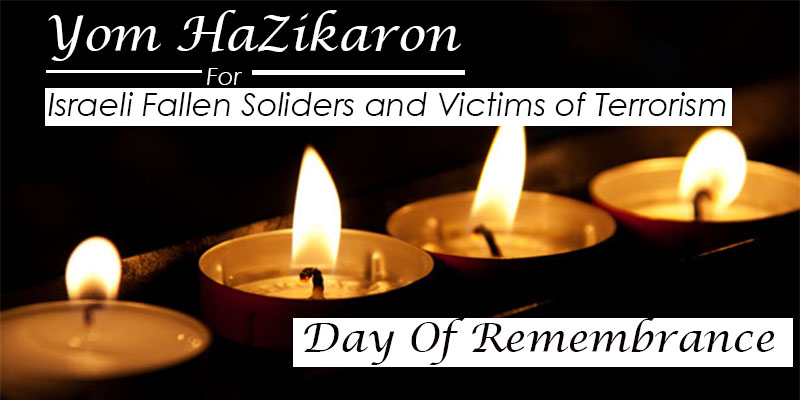
Yom HaZikaron, Israel’s Memorial Day, is set aside for the nation to remember and honor those who have sacrificed their lives while fighting to ensure a good future for their fellow countrymen. It is a day set aside for reflection on the price that defending one’s country has cost its citizens and families.
Israel is a small country, comparable in size and population to the state of New Jersey, with approximately 8.5 million people. Most Israelis have relatives or close friends who have died defending the nation.
Because there is such an intimate connection between the population of Israel and those who have died protecting her, Israel is serious about its memorial day. It is not about having a day off work, a long weekend, barbecues, or picnics, as memorial days can devolve into in large countries where the majority of the population is emotionally disconnected from the lives lost for their nation’s sake. On Yom HaZikaron, all places of entertainment in Israel are closed. It’s the law. Restaurants and shops are closed as well, by tradition.
The memorial day begins at sunset with the two-minute howl of an air raid siren, to which all Israel stops their activity, and stands in honor and respect for the fallen whose service cultivated the freedom they know today. The Israeli flag flies at half-mast. Radio and television stations air stories of past wars and programs fitting for the somber tone of the day. One television station plays a scrolling list of names of soldiers who died fighting to defend Israel’s freedom. Such lists are also read at memorial services in schools and synagogues on Yom HaZikaron. Many families include the reading of names in their personal memorial times. Since the Second Intifada (Arab spree of violence against Israelis) these lists have expanded to include those who lost their lives defending Israel’s public places from terrorist attacks. A second siren blasts on Yom HaZiKaron before prayers at services in military cemeteries.
According to the Jewish Virtual Library:
At the end of Yom HaZikaron day, the Israeli flag is raised high once again, signaling the nation to lift their hearts from mourning to rejoicing at the beginning of Yom HaAtzmaut, Israeli Independence Day. First, Israel honors. Then, Israel celebrates.
It was barely daylight on the first day of the JVMI medical clinic in Hosanna, Ethiopia.
Staff and volunteers assembled to prepare for a week of ministering to the physical and spiritual needs of the Gefat Jewish people, one of the Ethiopian Jewish communities whose heritage and customs trace back to Israelites dispersed into Ethiopia.
The history of the Gefat Tribe dates back 600 years, and today they are known locally as the “Fuga,” a derogatory term that means “hated, unliked people.” The original meaning of Fuga was “blower” because they were blowers of the shofar, but over the years, the term morphed into something insulting—more commonly expressed now as “may they dry up and blow away.”
But in spite of the century-long attempt at repressing the people they were there to minister to, everyone at the medical clinic on that early morning would soon learn that the deeply embedded heritage of faith of the Gefat Jewish people had not even come close to being suppressed.
As JVMI team members gathered to pray for Yeshua’s guidance and presence on the hectic first day of the medical clinic, the doctors, nurses, and other staff and volunteers didn’t know that the first patient of the day—a young pregnant woman in the late stages of labor—was already standing at their door.
Having walked from one of the most impoverished areas of Hosanna during the chilly, predawn hours that morning, the young woman—now only a few moments away from giving birth—waited patiently.
When asked through an interpreter why she had walked so many miles out of her way to the clinic instead of a hospital nearer to where she lived, she replied that God spoke to her during the night and told her to walk the dusty and distant miles to the Jewish Voice clinic.
The young woman had heard the Lord telling her that He would show her the way to the place she needed to be to safely give birth to her precious child.
Having delivered babies in our clinics before, we knew that assisting this woman in the delivery of her baby was likely far superior to the alternative. Conditions in many hospitals in the developing world can be challenging—especially with regard to sanitation and qualified medical staffing. They are often places where giving birth can be subject to poor conditions that may threaten the life of the mother or child.
Within mere minutes of arriving at the clinic, JVMI doctors and nurses were able to deliver her baby without any complications that may have arisen from her grueling walk. This faithful woman gave birth to a beautiful, healthy boy who she named Amanuel, meaning “God is with us” in her native Amharic language.
Later that week, when a terrified father carried his unresponsive adolescent daughter into the clinic, staff and volunteers hurried to swiftly create a makeshift oxygen mask to revive the girl. Her father was able to hastily communicate through an interpreter that his daughter’s unconscious condition was from seizures that she’d recently been experiencing several times a week.
The improvised oxygen mask was a success, and the young girl slowly began to regain consciousness, but what happened next caught everyone in the clinic by surprise. Not knowing where she was, how she got there, or who the many people standing over her were, she began to scream in absolute fear. Seeing the perilous situation, her father diligently tried to calm her while the medical staff quickly prepared and administered the IV sedation and seizure medication she needed.
In a situation that had quickly escalated from bad to worse, the medication acted quickly to calm the frightened girl. Shortly thereafter, the medical staff performed a thorough examination on her to determine what type of ongoing medication she needed so they could send her father home with what he needed to prevent another seizure.
Had the JVMI clinic not been available to this frantic father and his unresponsive daughter, it’s difficult to imagine what the outcome to this medical emergency might have been or whether the girl would have ever received the ongoing medication she needed to prevent future life-threatening seizures.
God’s timing is indeed perfect. The Bible tells us over and over again that it is not for us to know His plans, but to trust His timing in all things and His willingness to do good for those who love Him.
One of the hallmarks of Yeshua’s ministry on earth was His compassion for the broken. As He traveled from village to village, He healed many diseases and cast out demons, freeing captives from both physical and spiritual bondage.
Through your prayers and partnership, you’ve helped JVMI travel to villages in the far corners of the world to do good for those who love Him. Because of faithful partners like you, lives like those in Hosanna continue to be saved through the hope and healing of Yeshua. But the Gefat Jewish people represent only a small fraction of our international medical outreaches planned for this year and beyond. Our prayers are to offer the compassion of Yeshua to every impoverished Jewish community throughout Africa.
What we encounter on these outreaches is often immense and heartbreaking. Where traditional medicine can’t help, our Lord often miraculously provides personal healing. Most of those that receive our ministry have never seen a doctor nor heard the Good News of their Messiah. At our medical clinics, they have the opportunity to receive both.
We desperately need your continued prayer and support as we prepare for our next outreach planned for April 27—May 8, 2017, when we’ll minister hope and healing to the Lemba tribe in Masvingo, Zimbabwe. Since our first outreach to the Lemba living in poor rural villages like this in 2012, these ancient people of Israel have come to faith in Yeshua in remarkable numbers. Over 60 Messianic congregations have been planted. At last year’s outreach, more than 750 people prayed to receive Yeshua. With your help, that number will grow this year.
We’re told in John 8:47 that “He who belongs to God hears the words of God.” God has called each of us to minister to one person at a time. You may not be able to physically join us in Zimbabwe, but you can answer God’s call to help in other ways. Your financial gifts will help us distribute life-saving medicines, offer spiritual encouragement, and prepare the way of the Lord to one lost and hurting soul at a time.
Just as we were able to be a part of God’s perfect timing in Hosanna, your generous financial contributions will help us do good for all who love Him in every corner of the world.
There are many thousands of people waiting for our return to Masvingo this year. We don’t know what life-threatening medical emergencies may be waiting for us— whether it’s delivering a baby after his mother’s grueling walk or administering life-saving seizure medicine to an unconscious girl—but we do know the need is great to bring the hope and healing message of Yeshua to the scattered Tribes of Israel.
Friend, TOGETHER we can do it... one person at a time.
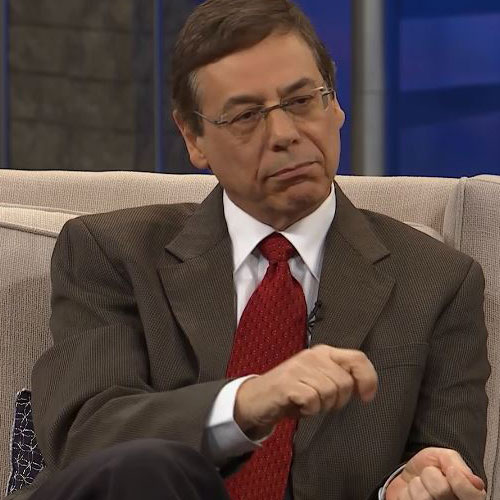
Former Iranian President Mahmoud Ahmadinejad threw his country’s upcoming election into turmoil last week when he registered as a candidate to run for president again.
You may remember Ahmadinejad as the Iranian leader who frequently outraged the West with his outbursts of inflammatory rhetoric and warlike policies during his eight years in office from 2005 to 2013. He questioned the scale of the Holocaust, called for the demise of Israel, and expanded Iran’s nuclear program.
His surprise candidacy is seen as a direct challenge to the authority of Iran’s Supreme Leader Ayatollah Ali Khamenei.
Khamenei had warned Ahmadinejad not to nominate himself, saying in September that his candidacy could create divisions in Iran and harm the country.
As quoted in the Jerusalem Post, Khamenei said, “He (Ahmadinejad) came to me and I told him not to stand as I think it is not in his interest and that of the country.”
At first, Ahmadinejad indicated he would comply and stay out of the race, saying he would support his former deputy Hamid Baghaei, who also registered on the same day.
But at a press conference last week, Ahmadinejad characterized Khamenei’s warning not to put his name forward as “just advice.”
Ahmadinejad’s candidacy must still be approved by Iran’s Guardian Council, which is closely aligned with Khamenei, who appoints half its members.
Ahmadinejad and Baghaei seem to be responding to a growing desire of hardliners in Iran, who seek a tough-talking candidate who will stand up to U.S. President Donald Trump.
Iran’s current president, the more moderate Hassan Rouhani, who negotiated Iran’s nuclear deal with world powers, is expected to run for reelection. And, he seems to still enjoy the support of Khamenei.
Some observers are speculating that Ahmadinejad may be registering as a strategy to help Baghaei, who is one of his primary allies.
In fact, Ahmadinejad was quoted as saying that he registered “only to support Baghaei.”
By registering as a candidate himself, Ahmadinejad may be trying to discourage the Guardian Council from disqualifying Baghaei. The thought is that the Council may not want to risk angering hardliners by voiding the candidacy of both at the same time.
The Council is composed of clerics and Islamic jurists and normally disqualifies dissidents, women, and most reformists. It is scheduled to release the list of approved candidates by April 27.
Last week after registering his candidacy, Ahmadinejad commented on recent missile strikes — ordered by President Trump against a Syrian government airbase — in response to a chemical weapons attack by Syria against a rebel-held town.
“I do not think it has a message for Iran,” said Ahmadinejad in the Times of Israel. “Iran is a powerful country and people like Mr. Trump or the United States administration cannot hurt Iran.”
The Trump administration had earlier this year announced it was putting Iran “on notice,” in part over its ballistic missile tests. Iran has been the primary regional supporter of Syrian President Bashar Assad in that country’s civil war. Iran is also directly involved in providing military support to the Syrian government.
All of this turmoil and uncertainty in world events makes our calling to be Yeshua’s (Jesus’) ambassadors more relevant than ever.
Will you join me to pray for peace in the region and for the people to be reconciled first to God and then to each other?
Thank you for praying in this way. Our interest is not a matter of politics, but of passion to serve the Jewish people in the name of their Jewish Savior and to proclaim His truth to all who will hear.
And, as you pray, I hope you’ll consider making a gift to Jewish Voice. Your support enables us to continue taking the Good News of Yeshua and compassionate humanitarian aid to Jewish people throughout the world.
For your gift of $35 or more today, we’ll send you an inspiring set of gifts. You’ll receive the Jerusalem/Grafted-in keychain plus the amazing DVD story of Majed El Shafie, a former Muslim turned Believer who was arrested, tortured, and sentenced to death for his faith in Yeshua. You’ll learn how he escaped and now advocates for the rights of religious minorities around the world. I want you to know how much I appreciate your prayers for the nation of Israel and the work of Jewish Voice among the people there and worldwide. Both your prayer and financial support are making a difference. We are so grateful for your help in this work.
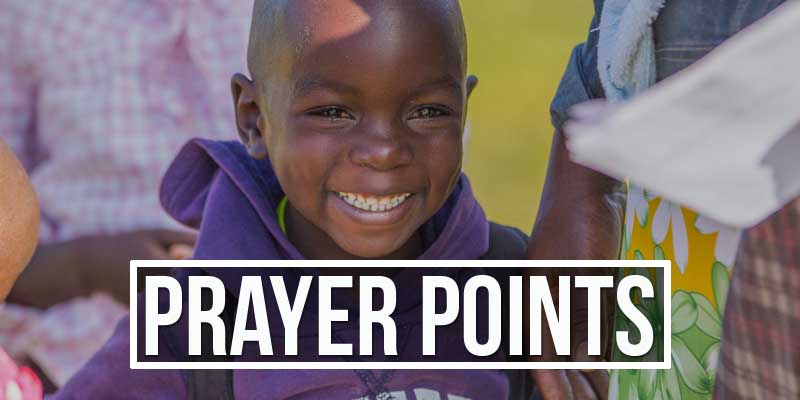
One of the definitions Merriam Webster gives for momentum is: “the strength or force that allows something to continue or to grow stronger or faster as time passes.” When we speak of spiritual things, we know that strength or force doesn’t come from us, but from the mighty power of the Holy Spirit.
That is why we are seeking the Lord for momentum in Masvingo. In 2015 we tried to reach out there but the door closed. We went in 2016, and now we are returning for our second outreach there with many of the same key team leaders and volunteer outreach partners. Spiritually speaking, together we tilled some hard soil, and this year on our return, we are hoping for an even greater harvest of fruit.
Please pray with us daily for the spiritual momentum to accelerate in Masvingo, Zimbawe as we return less than 9 months after our first outreach there.
Wednesday, April 19 through Wednesday, April 26 – Isaiah 40:3
Thursday, April 27 – Deuteronomy 31:8
Friday, April 28 – Psalm 86:9
Saturday, April 29 – Isaiah 30:15a
Sunday, April 30 – Ephesians 6:10
Monday, May 1 – Psalm 34:9
Tuesday, May 2 – Psalm 116:1-2
Wednesday, May 3 – Hebrews 2:4
Thursday, May 4 – Luke 10:27
Friday, May 5 – Psalm 126:3
Saturday, May 6 – Hebrews 4:9
Sunday, May 7 – Monday, May 8 and beyond – Acts 9:31
LORD, it is only You who can activate and sustain the momentum needed to see souls saved, bodies and minds healed, and lives changed, as we partner with You in deed and in prayer. May we see miracles beyond what we ask, and may the Lemba people and their neighbors in Zimbabwe receive blessing upon blessing from Your gracious hand as they come for care and find You. In Yeshua’s name, AMEN.
